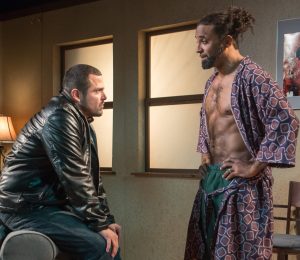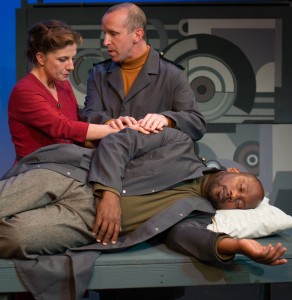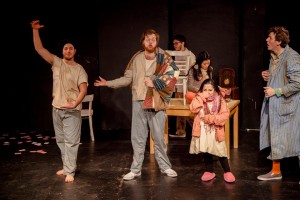The musical Lili Marlene takes its name from the famous German love song of World War II, first recorded in 1939. It became a hit among German troops (in spite of Joseph Goebbels’s dislike of it) and was eventually popularized among Allied troops as well, in a famous rendition by Marlene Dietrich in 1944. Yet that’s only an imaginative jumping-off point for the show of the title, which takes place between June 1932 and June 1933, at the tail end of the Weimar Republic and the first days with Adolf Hitler in power.
Fish Men
More than heated chess competitions occupies the center of Cándido Tirado’s New York premiere of Fish Men at INTAR, as five men who gather around the chess tables in Washington Square Park maneuver for higher stakes than mere checkmates in a game.
DannyKrisDonnaVeronica
DannyKrisDonnaVeronica is a captivating production about the modern family structure and the often untold truths of being a parent. Playwright Lawrence Dial explores the reality of marriage and life after children. Although it often seems taboo to speak about the visceral feelings of sadness and hopelessness associated with being a parent, Dial’s play explores the dichotomy of being completely enamored by one’s children while harboring feelings of dismay—the joys of having a family as well as those hidden, or rather, silent, moments of losing one’s identity and becoming irrelevant.
Addictions of the City
The characters are lively, the language is crisp and urban, and the acting is skilled in Stephen Adly Guirgis's The Motherf**ker with the Hat. The energy of classic salsa music in the house helps pump up the energy at T. Schreiber Theatre’s exciting production. Guirgis’s unabashedly vulgar play explores themes of love, morality and choice in one of the most diverse cities in the world, New York. His characters, although primarily of Puerto Rican extraction, encompass the multiple ethnicities of the city. Most are plagued with addictions and afflictions that raises the stakes of their every move. The play, one of Guirgis’s best, is both hilarious and thought-provoking.
It starts with a high energy-conversation. Veronica (Viviana Valeria) is on the phone with her mother, who has an addiction to alcohol; Veronica dislikes her mother’s fish-faced boyfriend and tells her, “You’re dating a “fuckin’ big-time loser with a head like a actual fuckin’ fish! …Ma, when you see him tonight: Take a moment. Take a breath. Take a real good look and just ax yourself in all honesty—‘Do I wanna fuck him—or fry him up with a little adobo and paprika...?’”
Wrapped around the jokes and comic dialogue lies the issue of coping, or rather, surviving. Guirgis’s characters are struggling with heavy substance abuse and making it one day at a time. Each day is a journey for them. They include Jackie (Omar Bustamante) who enters with flowers in his hands and greets Veronica with enthusiasm and love. He chants a rhythmic “These flowers are for my Beautiful Boriqua Taino Mamacita Love Me Long Time Princess fuckin’ Beauty Queen.” Having just landed a job, Jackie wants to celebrate. He begins talking about their future, possible promotions—their life together. Still, Veronica is having trouble getting clean..
While Veronica takes a shower, Jackie finds a hat—a hat he knows does not belong to him. He smells the bed and pillows. He then asks Veronica, “Why the bed smell like Aqua Velva and dick?” But Veronica denies any infidelity and tries to calm him down by suggesting they go eat some pie. (That’s right, pie.) He reluctantly agrees.
Ralph D (Casey Braxton) is another one of the conflicted characters in the play. As a sponsor, he is guiding Jackie on the path to sobriety. Yet he is also the cause of Jackie’s fall. Ralph D has had an affair with Veronica while Jackie was in jail. Although Ralph D cares about Jackie, he has completely betrayed him. Ralph D has stayed “clean” from his additions, but he is not "clean" morally or ethically. Victoria (Jill Bianchini) and Jackie try as well, but inevitably fall off the wagon.
Among the charismatic, enigmatic characters is also Cousin Julio (Bobby Ramos). Julio helps Jackie hide a gun that he has used to threaten the man he thought was the owner of the hat. “Leave the gun. Take the empanadas,” he advises, in one of many comic lines. Julio is a delicious dichotomy of a character. Humorous and deep, he values family and is brutally honest, and Ramos’s performance is a crowd-pleaser.
Director Peter Jensen keeps the production’s energy high, and scenic designer Miguel Urbino uses sets that are minimal yet functional. They resemble an urban setting that captures the lives of these characters. Sound designer Andy Evan Cohen provides a taste of the urban Latino scene in New York City with salsa and hip-hop playing between scenes and during intermission—including “So Fresh and So Clean” by Outkast and classics by Hector Lavoe.
The Motherf**er with the Hat is a production you won't want to miss.
The Motherf**er with the Hat plays through Nov. 19 at T. Schreiber Theatre (151 W. 26th St.) Evening performances are at 8 p.m. Wednesday through Saturday; matinees are at 2 p.m. Nov. 9 and 16. Tickets are $20 for general admission; $30 for reserved seating; $40 for dinner plus VIP reserved seating. For more information, call (212) 352-3101 or visit tschreiber.org. The production contains graphic language.
Is It a Crime?
Director Whitney Aronson’s approach to August Strindberg’s rarely produced Crimes and Crimes is to streamline and bring out the dark comedy that the play encompasses. Her adaptation of the Swedish playwright’s work has been updated to present-day New York City. She has taken the attitude that the realism and harsh events that occur in the original version undermine the notion of it as a comedy. For her adaptation, she says in a note, she wanted the audience to see and understand Strindberg’s play. Aronson’s version begins with Jean (Ivette Dumeng) and her show dog Maid Marian (played by actress Katie Ostrowski), a Hungarian sheepdog, frolicking in the park, enjoying their time as they wait for Jean’s husband, Maurice (Randall Rodriguez). Emile, Jean’s brother, later joins them, and they discuss Jean’s concern that Maurice is planning to leave her. (Aronson doesn’t explain why these residents of New York should have French names.)
Jean is afraid that she will not be able to afford Maid Marian’s dog show expenses if Maurice divorces her. Emile and Jean speak of how Maurice, an author, rarely takes her on his book tours or to social affairs. She tells Emile, “I don’t know, but I have a feeling that something dreadful is in store for me.” Suddenly Maurice appears and begins caressing Maid Marian, whom he clearly loves. He also gives the impression that he loves Jean and enjoys her company and physicality. In fact, he invites her to the opening of one of his plays and she refuses. She tells him she will be better at home with Maid Marian. They part ways, and the play begins to unfold the “something dreadful” that Jean fears.
Maurice goes off to meet and start an affair with Henriette (Christina Toth), who is in a lesbian relationship with his close friend (a man plays the friend in Strindberg’s original). The tension increases: Maurice must now decide if he stays with his wife or goes with his new lover. As he contemplates his decision and how difficult it would be to see Maid Marian if he divorces Jean, the dog mysteriously dies.
One of Aronson’s most radical changes to Strindberg’s original text is that Maid Marian is a replacement for the mistress’s daughter. She writes that she made this choice because she wanted the play to be more believable: “I actually did it because in the original, the child dies and nobody really cares.”
Although there’s a logic behind Aronson’s choice, it may not resonate with the same intensity as Strindberg’s. “I thought that the audience would not be able to forgive anyone in the play for so easily moving on from the death of a human child. A treasured animal’s death, though tragic and upsetting, is more consistent with the general reaction and behavior that Strindberg’s characters demonstrate.”
But even though the change from child to animal does lighten the mood and makes Maurice’s actions somewhat more forgivable, some of the plot stretches credibility. After the dog’s death, animal law enforcement appears to investigate the crime. As serious a crime as animal abuse is, it seems rather fantastical that a Broadway-type play would be pulled because of animal abuse. In any case, Maurice is charged as the main suspect, but he is eventually exonerated. Within hours of his release, Maurice’s reputation is ruined, and his play is pulled.
Whether the choice to change the daughter to a sheepdog is fully justified or not, it does not take away from the lightness of the play. It does, however, make the circumstance melodramatic and absurd, which brings out the humor in the play.
Matthew Hampton and Holly Albrach’s costuming of the characters is impeccable: fashionable and in line with the current New York scene. They employ an approach to the Hungarian sheepdog that seems to draw inspiration from puppet theater. It was entertaining and just simply delightful to the eye.
The sound design by Andy Evan Cohen makes the transition between scenes lively, using instrumentals of popular pop songs. They are played with a classical twist, so the audience is left to try and identify the familiar tune.
Aronson has accomplished her goal. The play has witty moments and comic scenes. The absurdism makes for great melodramatic humor as well. The revision keeps the audience focused on its entertaining and engaging story for the entire duration.
Crimes and Crimes plays through Aug. 20 at the Gene Frankel Theatre, 24 Bond St., in Manhattan. For tickets, call (212) 868-4444 or visit www.strindbergrep.com.
What If—Robots?
What would happen if technology rebelled against us? One possibility is explored in Mac Rogers’ Universal Robots, a science-fiction play set in Czechoslovakia after World War I. It is inspired by the 1921 sci-fi drama R.U.R., by the Czech playwright Karel Čapek. Čapek’s play, whose initials stand for “Rossum’s Universal Robots,” introduced the word “robot” to the English language and was instrumental in establishing the robot as a character.
Rogers expands upon Čapek’s world and creates his own universe filled with wired beings. The play eases into the realm of human-like robots in the first act. It begins with the gathering of the ensemble of robots (of which the audience is not aware) chanting of how they tell their story to remember. Remember what? This chant will surface again and connect many dots for the audience of whose story they are truly telling.
As the play opens, the characters are gathered at their local watering hole in Prague. The café is frequented by a playwright, Karel (Jorge Cordova), his sister, Jo (Hanna Cheek), who is a sculptor, and their barrage of friends. Here, they drink, laugh and discuss many of society’s conundrums. Life is good. Helena (Brittany N. Williams) enters the café, pushing a wheelchair containing an automaton, and introduces them to the object that will change their world. She asks them to come see the lab where the human-like robot was created. Their intrigue and fear grow, yet they ultimately agree to go with Helena to visit the plant and meet the automaton’s creator, Helena’s mother, Rossum (Tandy Cronyn).
After their visit, the world they know changes. They decide to embark on a mass production of automatons. They fear the loss of human employment and self-efficiency but establish ground rules to keep their creations in balance. They all agree to an established set of boundaries, and a union is formed. The robot production begins.
As the play progresses, Hitler is on the rise and a representative from the United States visits the President of the Czech Republic (Sara Thigpen), who is one of the major people in charge of the automaton project. Up to this point the group had decided that the automatons would not be used for war or programmed to kill, and now they are faced with saving millions of people or going against their values. They choose humanity—or do they?
Rogers outlines the deterioration of many of the close-knit human relationships from the beginning of the play. The pressure and guilt of programing the robots to kill prove to be too much to handle for some. One relationship with a sweet, sad dynamic is that of Jo (Hanna Cheek) and the robot Radius (Jason Howard), who was a human waiter, Radosh, who passed away and is later reincarnated as the face of the lead automatons. Radius is no longer human, but the physical association and emotions that tie Jo to Radius are very human. It brings up the question of where does humanity live, in the flesh or the soul? Howard shows versatility as he skillfully switches from human to robot with his diction and physicality. In his scenes with Jo he is able to capture the softness of a human yet parallel it with the sterility of a robot.
Rogers does a fantastic job of posing such deeply rooted questions that force the audience to really think about choices, good, evil and humanity as a whole. Rogers delves deeply into these complex themes and creation questions. He poses a hypothetical where choosing the lesser of two evils could be at the expense of humanity. Although the play deals with relevant issues, at times it feels as if he might be trying to tackle too many deep questions for one sitting.
Director Jordana Willams has put together a diverse cast of 10 in Universal Robots, a powerful, thought-provoking play that should be appreciated not only by sci-fi enthusiasts but anyone who is interested in thinking about the world’s “what ifs.”
Universal Robots runs through June 26 at the Sheen Center (145 6th Ave.; entrance on Dominick Street). Evening performances are at 8 p.m. tonight and Wednesday through Saturday; there is also a 2 p.m. matinee on Sunday. Tickets are $25 for general admission and $18 for students and may be purchased online at web.ovationtix.com/trs/pr/957321.
Love in the Fen
There are some choices that are done in the name of love. Fen, by British playwright Caryl Churchill, directed by Patricia Lynn, presents the choices many would not consider. As the audience walks into the lower theater of IATI, the set is staged with five metal wash buckets used for collecting vegetables and stones, a table and two chairs, all representative of the agricultural life in Britain in 1983. Most of the townspeople work on the local farm. They share their stories and also bare their shame there.
Upon entering, the audience finds itself in the middle of a love affair between Val (Aimee Ranger) and Frank (David Rudi Utter). She has left her husband and two daughters to be with the man she loves. She has broken traditional gender roles and is torn with being morally correct and being with the love of her life.
As the play continues, the audience is introduced to a daughter and her stepmother, played by Lauren Lubow and Katie Consamus, respectively. All the characters take on multiple roles, and among the outstanding cast, Lubow skillfully switches out of hers effortlessly and poignantly.
The women’s stories are intriguing and tragic. Their lives reflect the small-town and farming mentality where poverty permeates the air. Love is often not a choice but a luxury. We see the abuse of a stepmother continue, a farm owner contemplating selling his land; we see hunger and loss. All through these stories is woven the notion of love and what it means for these people. Churchill is a great storyteller and her characters, although there are many to keep track of, reflect the deepness of her words.
Throughout, Lynn has drawn excellent performances from her actors. Lynn does a spectacular job of organizing seamless transitions and strategic blocking; still, the number of characters became confusing. Additionally, Lynn and set design consultant Allyson Lubow’s use of the space was excellent. The space can feel rather confining, but the production used all of it efficiently and relevantly. It felt like we were in the outskirts of their world, peeping in quietly.
As Val comes to grips with the dilemma of leaving her family for love, she arrives at a decision that will end her misery.The decision may seem rash and illogical to a viewer, but considering her outlook on life, it might have been the best one.
Fen leaves audiences thinking about choice and love and everything in between.
Presented by Red Garnet Theater Company at the IATI Theater Black Box, 64 East 4th St. Closed Feb. 21.
Writer Madness
The Golden Smile by Yaakov Bressler and directed by Joey Stamp is an absurd, hilarious and energetic play that is sure to break the winter funk. The play opens with a group of characters, patients to be more exact, in a mental institution. The patients try to create a play that will save their privileges in the recreational room. Some patients have an ulterior motive to win the heart of their beloved Claude–who is never seen but heard about in songs. Theatergoers enter the patients’ world, which is filled with twists and turns, and witness what the patients will do to write their play.
The cast is fun and filled with energy. The audience gets to see a glimpse of the characters’ mental conditions and personalities. However, their personalities can be more diverse and more nuanced as the play provides the space for this type of character exploration. One actor that stands out is Sofiya Cheyenne (Group Leader). Cheyenne is captivating and delivers a strong and engaging performance. Cheyenne really puts a punch to the witty and sarcastic lines. The entire cast, Andy McCain (Writer), Jody Doo (Sarcastic Actor), Flynn Harne (The Messenger), Robert DiDomenico (Loathing Actor) and Isaac Boorstin (Angry Actor) are talented and versed in both acting and musical theater.
The songs are playful, graphic and wacky. Composer and Musical Director Zach Stamp matches the music with these wonky characters. The music moves along with the tone and nature of the play. Costume and Prop Managers Rivkah Spolin, Shelly Ben-Yshay and Carrie Pieper designed the set and costumes accordingly. The set and costumes coordinate with the vibrant personalities on stage. They do an excellent job alongside Stamp’s direction. The creative team piece this insane world together for audiences to be hooked for a whole hour!
There are two plots in this play: one of the actual play and the other of the characters’ creative play. The big plot flows and the audience clearly understands the wants of each character. They all collectively want to write this play but they have different ideas and direction on how to go about it. How they figure it out is the fun part for the audience. Eventually, the group comes to an agreement and they have a play. Their play’s plot gets a little sloppy when they begin their quest for the Golden Smile. Then again, they are mental patients so their level of coherence may be off. Bressler has to be very clear with his intention at this point. The patients show strength, courage and determination, and represent much of who they are as a group.
In the end, they create a tender story about preservation and happiness, which by the same token is ironic considering their circumstances. They find their “golden smile” as many writers or artists in general find theirs. Bressler seems to be drawing connections to how insane the writing process is for writers and what better way to show this than to have mental patients trying to write a play. It is a wonderful premise and one that many writers would agree with. This is Bressler’s first play–he has a knack for humor and sharp dialogue. Audiences will be excited to see how his work evolves.
The Golden Smile serves to be an exhilarating night at the theater. Watch it for the humor, energy, witty lines and music. It is sure to get everyone walking out with a smile and maybe even a golden one.
The Golden Smile is part of the Frigid Festival, which is showing over 150 performances in two theaters and over the span of three weeks. The festival is founded on the idea of providing theater artists the opportunity to produce their own work.
The Golden Smile runs until March 5 at The Kraine Theater (85 East 4 St. between 2 and 3 Aves.) in Manhattan. Tickets are $15. To purchase tickets, call (212) 777-6088 or horsetrade.info.
Confessions from a Bathtub
How does she get those bubbles to last an hour? This might be a very logical thought as audiences watch this delightful, boundary breaking, one-woman show Broken Bone Bathtub written and performed by Siobhan O’Loughlin, presented by Elephant Run District in bathrooms across New York City. The premise of the project is to have volunteers donate their bathrooms for an unforgettable evening of theater. Most of the donors are friends and fans, following in the New York tradition of playwrights who staged plays in friends' homes. The location of the show is revealed about a week before which adds to the mystical allure of the production. Upon entering the locale, the audience is greeted warmly with wine and hors d’oeuvres. The host’s living room serves as the lobby and waiting area, where complete strangers get the opportunity to mingle and converse prior to the show. The ambiance and cozy nature sets the tone for the intimate experience that lies ahead.
The audience enters the bathroom, which is quaint. It seats four if the toilet is used as a seat (which it was). Before going in, the team asks if everyone feels comfortable with audience participation and if there is anyone that really feels comfortable. Someone’s hand goes up and the selection is finalized.
Our gusty volunteer enters first. O’Loughlin is waiting in the bubble-filled tub. The show begins. At first, the setup may appear to be a naked, woman in a bathtub having an intimate conversation with four strangers in yet another stranger’s home. The levels of awkwardness have definitely heightened by this point. Yet, the true structure of the production reveals itself as she begins to tell her story of what happened to her arm and why she needed to use her friends’ bathtubs.
After a serious bike accident, O'Loughlin finds the strength to ask her friends for help as she heals not only her arm but her soul. She tells the explicit details of her accident as she delves into human issues and ideologies. She tries to dissect the nature of human relations and connection, all while performing the cleansing act of taking a bath. One thought-provoking moment occurs when she asks the audience, “When was the last time you held someone’s hand?” It was a simple question yet the answers can vary greatly: sad or happy, romantic or friendly, and healing or hurtful. The audience paused for a minute to fully grasp the depth of the question. After a few responses, O’Loughlin makes a rich connection to hands and touch, and how in many ways, simply holding someone’s hand is a true act of humanity. It had an endearing quality and made the audience think and feel.
O’Loughlin does an excellent job of storytelling and audience engagement. It takes bravery and heart to sit share a story and seek comfort with strangers while sitting naked in a bathtub. O’Loughlin is extremely charismatic and has a magical quality that compels audiences to stay and wash her back.
Broke Bone Bathtub is running until Jan. 31st. Tickets are sold-out for the remaining shows tonight at 7 p.m. and 9 p.m. and tomorrow, Jan. 31 at 2 p.m. and 4 p.m. For more information, visit http://siobhanoloughlin.com/nyc/ or http://elephantrundistrict.org.















